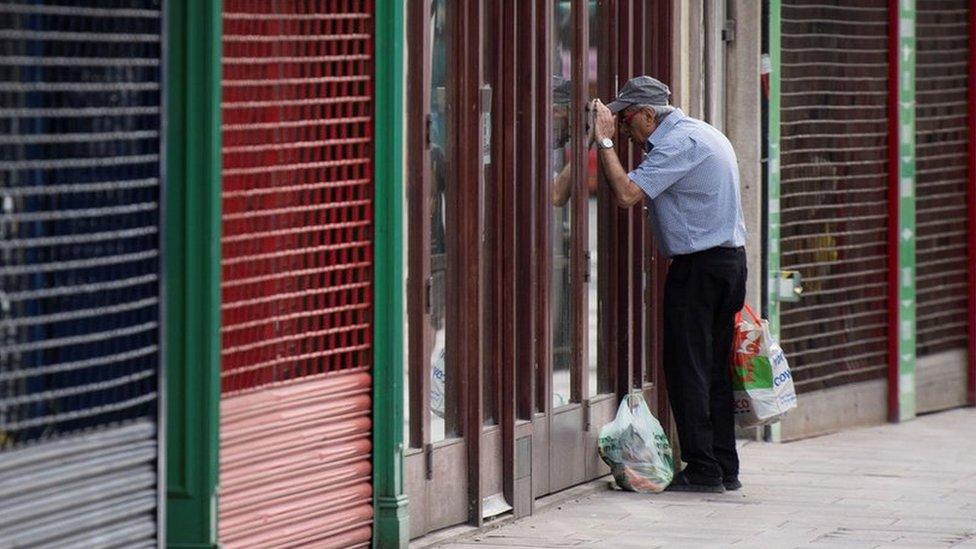Record levels of women in work across Scotland
- Published

The level of "economic inactivity" dropped 21.5% in Scotland
More women are in work in Scotland than ever previously recorded, the latest employment figures show.
The Office for National Statistics labour market report, external shows the employment rate for women aged 16 to 64 was 74.9% - the highest level since these records began in 1992.
Scotland's overall employment rate rose to 75.8% from June to August.
Employment minister Richard Lochhead said Scotland's economy continued to show "resilience".
And Scottish Secretary Alister Jack said the figures showed the country's labour market "remains strong".
The employment rate was the joint second highest for the country since 1992 - along with the periods March to May 2019 and May to July 2017 - and higher than the overall UK rate of 75.5%.
Unemployment rose slightly to 3.3% from a record low of 3.1% reported last month, and the level of "economic inactivity" dropped 0.2% to 21.5% in the three months to August.
Across the UK as a whole, the unemployment rate fell to its lowest level in nearly 50 years, as the number of people not looking for work because they are suffering from a long-term illness has hit a record high.
Average pay also went up 6% over the summer quarter - with a 2% increase for public sector workers and 6.2% for the private sector.
Separately CBI Scotland has reported that job vacancies remain high, with more than 70% of businesses believing access to labour and skills threaten labour market competitiveness.
Matthew Percival, CBI director for skills and inclusion, said: "It is crystal clear that labour market shortages are having a material impact on firms' ability to operate at full capacity, let alone grow.
"Businesses are pulling every lever they can to attract and retain employees, but this is making productivity boosting investments like training and automation harder."
'Serious challenges' for Scotland
Scotland's employment minister said Brexit policies were continuing to cause labour shortages, and have a negative impact across Scotland.
But Mr Lochhead added: "The Scottish economy and labour market are continuing to show resilience.
"This is despite the serious challenges Scotland is facing as we recover from the pandemic, the ongoing cost crisis impacting businesses and households, the continued impact of Brexit and the economic consequences of Russia's illegal invasion of Ukraine all impacting on the economy."
He has requested the UK government establish a joint taskforce with devolved nations to alleviate the pressures caused by labour market shortages.
"The UK government holds key powers over migration, visas, VAT, National Insurance and key parts of employment law," he added.
"Despite agreeing to engage with the devolved nations on these issues in June, we have received no further response to our request for a joint taskforce."
'Extensive support package'
The Scottish Secretary said the unemployment rate was at a "historic low".
Mr Jack added: "The UK government's overarching priority is economic growth, for the benefit of people in Scotland and across the whole of the UK.
"One of the best ways to achieve this is getting even more people into highly skilled, well paid jobs, to help them and their families thrive.
"We've also put an extensive support package in place to help those worried about the cost of living in the short term."
He said this included direct payments of at least £1,200 to the most vulnerable families and saving households an average of £1,000 a year through the Energy Price Guarantee.


There's been a rise in the UK's economic inactivity rate. These are people who are not available for work, often because they are looking after family, or they are students, or they have long-term illness.
The Scottish level has fallen in the past year, bringing it very close to the UK one.
That long-term sickness level has reached a record high with today's figures. We don't know from these figures but we can take a guess that long Covid and NHS waiting lists may have quite a lot to do with that.
One take on the high job vacancies referred to in the CBI report is that there are more vacancies than there are unemployed people for the first time on record, but they have dropped back a bit as recruiters rein in their efforts to expand their workforces.
It's a significant factor in holding back the potential of the economy.
If you look around you, you can see lots of shops, cafes, restaurants, only open for four days a week, maybe, or operating limited hours.
Often that's because of a lack staff. Multiply that around the country you can see the lost potential growth for these firms at a time when the government wants us to focus on economic growth.
And there's a cost to business. They still have to pay overheads - for rents and business rates. There's a cost to the stress this places on staff who are at work, and managers struggling to plug gaps, fulfil orders and so on.
This extends to the public sector as well where there is not only a lack of recruits but a squeeze on the funds to do the recruiting. It was only quietly announced last month but there is now a recruitment freeze on vacancies across most of the Scottish public sector.
This is partly a labour market failure to match the skills on offer with the skill employers need, but also a big exodus of older workers following the pandemic, but Brexit has to be part of this story because so many jobs across many sectors were filled by people from the EU who longer have the automatic right to work here.

- Published11 October 2022

- Published11 October 2022

- Published5 October 2022

- Published13 September 2022
